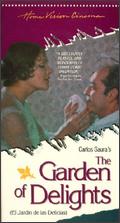FILM NOTES

(Spanish, 1970, 95 minutes, color, 16mm)
Directed by Carlos Saura
Cast:
Francisco Pierra . . . . . . . . . . Don Pedro
Luchy Soto . . . . . . . . . . Luchi
Lina Canalejas . . . . . . . . . . Aunt
Alberto Alonso . . . . . . . . . . Tony
The
following film notes were prepared for the New York State Writers
Institute by Kevin Jack Hagopian, Senior Lecturer in Media Studies
at Pennsylvania State University:
Carlos Saura began directing during the long night of Spanish Fascism. Only the Spanish master of surrealism, Luis Buñuel, then working in Mexico, was able to voice the political longings of the Spanish Left against a world dominated by Francisco Franco. For younger directors like Saura, Basilio Martin Patino and Mario Camus, the only options were indirection and allegory. Quietly, Saura and a new generation of filmmakers chipped away at the Franco massif. In films like LAMENT FOR A BANDIT (1963) and THE HUNT (1966), Saura portrayed the violence and gangsterdom of the Franco regime slyly, his criticism of male social groupings read by many knowing viewers as a searing analysis of Spain’s dictatorship. In his films, Saura’s editing and narrative strategies would often run the past headlong into the present, so that his characters, and his audiences, were frequently unable to tell the difference between the two. For Saura, the agonies of the Spanish Civil War had not ended with the vanquishing of the Loyalist forces in the late 1930s. Franco’s rise to power had only been the gathering of the storm, Saura’s films seemed to say, the source of the cold black rain that fell unrelentingly on Spain’s heart in the 1950s, the 1960s, and the 1970s. As he gingerly walked the line between allegory and outright social criticism, Saura occasionally raised the suspicions of the nation’s notoriously dull-witted censors and thick-skulled junta men. But his student and intellectual audiences were loyal. So, too, Saura built up a loyal cadre of co-workers, giving his films a visible continuity to complement his increasingly courageous anti-Franco narratives. Of his anti-Franco allegories, Saura said they arose out of " personal compulsion . . . I was overcome by the pressures within Spain, when I felt I was going to burst." His films, perhaps conceived as self-therapy, became a nation’s articulation of a spirit of revolt against tyranny.
With THE GARDEN OF DELIGHTS, Saura’s anti-Fascism was gloriously outed. Now, his symbolism became more brazen, his settings less allegorical, his antagonistic characters more recognizable as Fascist surrogates. The film features an oddball collection of greedy relatives sniffing after a dying millionaire’s secret fortune. The man has been paralyzed in a car accident, and has the lost his memory. The money-mad relatives want him to be able to remember where he’s stashed his money, and in an effort to jog his memory, begin acting out scenes from his past. But the man’s past is the past of Spain itself, and the scenes they choose for their tableaux have the scent of the Civil War about them, as once again, the past masters the present in Saura’s agile, cynical mind. THE GARDEN OF DELIGHTS gleefully assassinates the institution of the family, one of the Franco regime’s most sacred social constructions. The film also struck some as suspiciously like a preview of the power struggle that was sure to follow the aging Franco’s death. The film’s conclusion is bitter and apt, yet it replaces an even more angry ending, in which the vile relatives are torn to pieces by a pack of wild dogs bearing some resemblance to themselves.
This time, Saura had gone too far. Even the sluggardly Spanish censors figured it out, and banned the film for seven months. Non-Spanish critics, freer to speak, hailed the film, and a print was smuggled out to the New York Film festival, where it won additional international plaudits. Under pressure, the Francoists relented, and released the film with a few strategic cuts. Gone, for instance, was a stirring shot of the old Republican flag, and a Buñeulesque shot of the nurse breastfeeding the doddering millionaire.
Within a few years, THE GARDEN OF DELIGHTS would become a prophecy realized. Franco would be dead, and his political heirs would slaughter his legacy, such as it was, in a self-immolating struggle for power. Spain would finally have its democracy, and the martyrs could at last smile in the tombs.
Saura’s spectacular 1983 CARMEN would be his most commercially successful film, and the single work by which he is still most well-known around the world. To Spaniards, though, Carlos Saura has an honored place among the now-graying veterans of the anti-Franco struggle. In his 1960s and 1970s works, Saura seemed to understand Jean-Luc Godard’s dictum that "cinema is truth at 24 frames a second." Saura’s truth was sardonic, and mocking, an over-the-shoulder sneer at officialdom that shows the power of satire to change the world.
— Kevin Hagopian, Penn State University
For additional information, contact the Writers Institute at 518-442-5620 or online at https://www.albany.edu/writers-inst.
 The Garden of Delights
The Garden of Delights